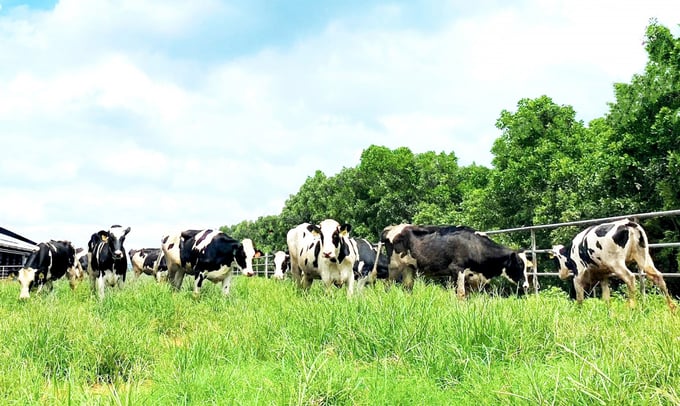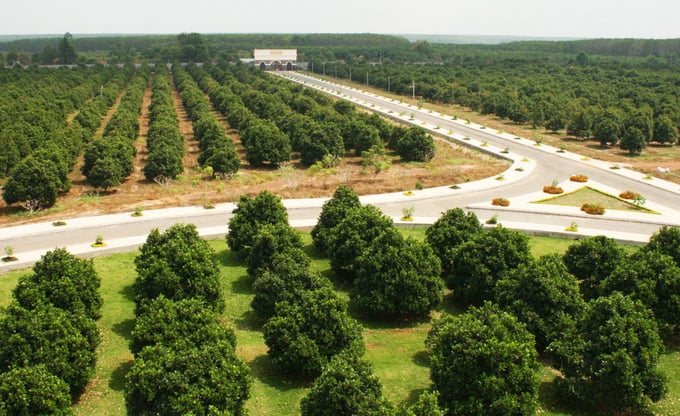May 29, 2025 | 16:04 GMT +7
May 29, 2025 | 16:04 GMT +7
Hotline: 0913.378.918
May 29, 2025 | 16:04 GMT +7
Hotline: 0913.378.918

Vinamilk is one of the top enterprises that develop in the direction of green economy and circular economy.
Looking back at the 27-year journey of the High-Quality Vietnamese Goods program, it is clear that many enterprises have strived well to become high-quality Vietnamese goods enterprises, providing top-quality products for both domestic consumption and export. There have been many export goods that gain success, thus bringing Vietnam's economy to a fairly good position on the world map. Among them, products like coffee, seafood, pepper, and wooden furniture are the most popular.
But according to Economist Pham Chi Lan, at a time when the global economy is strongly transitioning towards “green economy”, it is not enough just to have high-quality goods. The current context pushes us to think about "green development".
After the Covid-19 pandemic, people are more conscious about gaining a deeper understanding of life without excessive harm to nature. On the other hand, climate change also causes extremely devastating problems, requiring countries to pay attention to greener, more environmentally friendly development and join hands to better protect the environment.
"Green development, green growth is extremely important and necessary for us now. We need to start taking immediate action for today's generation as well as the future generations of the country. If we don't do it now, it would be too late to start over and save our own lives in my own country," said Economist Pham Chi Lan.
Recent studies point out that the middle class and Generation Z are the two subjects that determine current and future consumption trends. In particular, these groups of consumers are willing to pay higher prices for environment-friendly products and are willing to boycott products that are harmful to the environment.
After 10 years of observation, Economist Pham Chi Lan found that many businesses were aware of this fact early on. Some pioneering businesses put a lot of effort towards developing green economy. For example, Vinamilk has achived great success and is one of the leading enterprises in developing towards green economy. The enterprise’s dedication can be seen from their organically grown grass fields, organic cow rearing technologies to the organic products presented on market.
Vinh Hoan Corporation (VH Corp) is also a prime example as the first enterprise to enter the circular economy. VH Corp’s elaborate and strenuous initial investment paid off with much higher efficiency to the business. Vinamit in the past few years has also followed the green economy and led many other startups in agriculture. Even young people who started their businesses by doing things “green, local, and environment-friendly” receive investment from Vinamit.
Developing green economy is a way for businesses to improve their competitiveness and earn consumers’ trust, thus creating the foundation for the businesses’ sustainable development in the future and the ability to keep up with important world trends.

Vinamit Organic Farm, a 150-ha farm located in Phu Giao town, Binh Duong, has achieved the certifications of Organic Farming and Organic Agricultural Products according to USDA Organic Standard.
Despite the essentiality of the world trend, it is not easy for businesses to walk the path of green economy. Economist Pham Chi Lan points out three important matters that enterprises, especially those in the agricultural fields, need to resolve to sustainably develop green economy.
Firstly, enterprises need to build green supply chains in order to follow the path of green economy development together, thereby forming “real” green enterprises. Secondly, it is deemed essential to strengthen training for employees on green economy, particularly in terms of awareness, skills, working attitude, and seriousness to comply with all green regulations. Thirdly, enterprises must secure financial resources for green economy in the context of high inflation and a global economy full of fluctuations.
According to Mr. Nguyen Hoang Linh, Deputy Director of the Directorate for Standards, Metrology and Quality (Ministry of Science and Technology), green standards are needed to develop green economy. Vietnamese businesses therefore need to actively develop their own standards as it will serve the interests of the Vietnamese business community to engage deeply with the world market.
Vietnam has currently developed 13,500 national standards with a ratio in harmony with world standards in all fields. This is a technical foundation to help ministries and sectors build approximately 800 national quality guidelines with the goal of ensuring safety and fairness in production and business. Following the government’s orientation to 2030, the Ministry of Science and Technology will continue to improve and update new standards, bringing the world's standards to Vietnam for application in the business community as quickly as possible.
Translated by Samuel Pham
/2025/05/25/4127-3-073637_820.jpg)
(VAN) Thanks to the promotion from an FAO-implemented project, vegetable production in greenhouses in Moc Chau has seen strong development, from 1.5 hectares in 2021 to nearly 50 hectares in 2024.

(VAN) FAO has recently supported USD 140,000 to implement the project 'Risk mitigation human-animal interface risks through disease control initiatives in pig farming.'

(VAN) The People's Committee of Tra Vinh province has approved an adjustment to the investment policy for the Green Hydrogen Plant project, increasing its area to approximately 52.76 hectares.
![Reducing emissions from rice fields: [2] Farmers’ commitment to the soil](https://t.ex-cdn.com/nongnghiepmoitruong.vn/608w/files/news/2025/05/05/dsc08881jpg-nongnghiep-140632.jpg)
(VAN) Clean rice cultivation model in Thuong Tan commune, Bac Tan Uyen district, is assisting local residents in achieving sustainable agriculture by substantially reducing costs, increasing productivity, and protecting the environment.

(VAN) At the conference to disseminate Resolution No. 68, AgriS introduced its digital agricultural ecosystem and reaffirmed its commitment to accompanying the Government in promoting private sector development and sustainable agriculture.

(VAN) 'Blue Ocean - Blue Foods' initiative is designed to restore marine ecosystems and establish sustainable livelihoods for local communities by cultivating a minimum of 1,000 hectares of cottonii seaweed in the first three years.
/2025/05/21/4642-3-112707_603.jpg)
(VAN) The V-SCOPE project has made direct contributions to three out of six pillars of the Comprehensive Strategic Partnership between Vietnam and Australia.